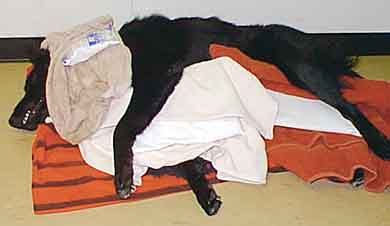Across the country temperatures are rising. Days are getting longer, and most people are spending more time outside with friends and family, including our four-legged buddies. Indeed summer is just around the corner. With warmer weather comes some potential risks to our pets. This week I’ve invited Dr. Adesola Odunayo, a fellow board-certified veterinary emergency and critical care specialist who shares some useful advice about keeping your fur babies safe during the warmer months. Happy reading!
I’ve been enjoying the beautiful spring weather for a few weeks now, and summer is just around the corner. Summer is synonymous with many things for me – farmers’ market, hiking trips, barbeques, local fairs, ice cream, picnics, beaches, and baseball games. It also means I get to spend more time outdoors with my dogs. One of my dogs loves the local dog park right next to us; she steers me towards the park every time we go for a walk and refuses to move if it appears we aren’t going to make a turn towards the park.
As I start to mentally prepare for the many satisfying summer events, I also think about millions of people looking forward to enjoying the season with their pets. While there are countless activities for pets and their families, there are also hazards that are more common during the summer months. As a board-certified veterinary emergency and critical care specialist, I want to share some of the more common reasons for which I see dogs and cats for during the summer months. I’ll also share some first aid tips related to those hazards, as well as tips for avoiding a trip to the pet emergency room over the next few months.
Summer Tip #1: Beware of the heat!
Ensure your dog is slowly acclimatized to the warm weather during exercise, and don’t leave your dog in the car for any reason.
There is no excusable reason for leaving a dog in a locked car!
One of the most common hazards of the summer is heat-related illness in dogs (seen very rarely in cats!). Also called “heat stress”, “heat exhaustion”, or “heat stroke”, heat-related illness occurs when dogs get overheated during exertional activities like playing in the park, running with an owner or chasing a mail carrier. More often than not it happens because the dog did not have an opportunity to acclimatize to the change in temperature and humidity. In some cases heat-related illness occurs when owners leave their dog in a locked car on a hot day.
Heat-related illness can be very severe and lead to death! Affected dogs usually pant very hard, are lethargic, may not want to eat, and may have really bad diarrhea. Any dog with suspected heat-related illness should be seen by a veterinarian immediately. Many locales have at least one veterinary emergency hospital open all night. Seek veterinary help immediately – do not wait until your family veterinarian is available in the following morning! You should help cool down pets at home before heading to the animal hospital by placing towels wetted with lukewarm water over their necks, in their armpits, and between their back legs. Affected dogs will likely required at least one night of hospitalization, and many affected dogs are hospitalized for several days. Treatment is usually quite intensive and may be fairly expensive.

Pet owners can begin cooling down a dog with heat-related illness before transporting to a veterinary hospital by placing towels wetted with lukewarm water over the neck, in the armpits, and between the back legs.
The mortality rate for heat-related illness can be very high so it’s best to prevent this potentially life-threatening issue by ensuring dogs are allowed to slowly acclimatize to increased humidity and warm temperatures before excessive exercise. As outside temperatures begin to increase, go outside and initially work/exercise with your dog for only a few minutes and slowly work up to the level of exercise your dog normally performs in colder weather. If possible, walk or run with your dogs early in the morning or later in the evening when heat and humidity are often more tolerable. Pay attention to your dog during outdoor activities, and stop when your dog is slowing down or refusing to move. Never leave your dog in a vehicle regardless of how long you think you are going to be gone. Finally always make sure your pet has access to ample volumes of fresh cool water!
Summer Tip #2: Know where your pet is at all times!
Another common summer issue for dogs and cats is vehicular trauma. Warmer temperatures usually mean pets spend more time outdoors either in backyards or with their families at dog-friendly parks and beaches. They also avail more opportunities for pets to escape backyards and be let off a leash.
More people spend time driving around in the warmer months, and vehicular accidents involving dogs and cats occur commonly. Depending on the severity, motor vehicle accidents can be life-threatening. Occasionally injuries are predominantly internal and the pet looks relatively well to the naked eye. Any pet involved in a motor vehicle accident should be evaluated by a veterinarian as soon as possible. To reduce the likelihood your pet is involved in an accident, ensure all fences and gates are repaired. Minimize unsupervised time for dogs that are more likely to escape from the fence. Keep your dogs on a leash at all times when outside – remember it only takes a second for your dog to run after a rabbit across the street. Cats are not exempt from injury and should be kept indoors if at all possible.
Summer Tip #3: Beware of fleas, ticks and mosquitoes!
Ectoparasites love the summer weather too and often become insufferable pests in most part of the country. Fleas, ticks and mosquitos can transmit diseases that may cause serious illness in dogs and cats, include heartworm disease (dirofilariasis), Lyme disease (borreliosis), and Rocky Mountain Spotted Fever (blue disease). A pet infested with large numbers of fleas and/or ticks can also become very anemic, and may require a blood transfusion.
Ectoparasites can be controlled with various different oral and topical medications that should be obtained from your family veterinarian.
Avoid over-the-counter flea and tick medications, especially in cats.
Some over-the-counter medications can cause tremors or seizures that can be life-threatening to cats. If your cat starts to have tremors after applying a flea/tick product, seek immediate veterinary medical attention! Treatment of an infested pet alone is not enough. Environmental treatment is also essential! If your pet has been infested with fleas, be sure you to have professional treat your home for fleas too to prevent reinfestation! Speak with your family veterinarian about heartworm prevention. If you live in a region of the country where heartworm disease is possible, both dogs and cats should receive year-round prevention!
Summer Tip #4: Avoid snakes!
Snakes come out of hibernation to eat and enjoy the warmth of the sun aorund the same time dogs and cats spend more time outdoors. Depending on your local there are a handful of venomous snakes with whom your pet may come into contact, including coral snakes, copper heads, rattle snakes, and water moccasins/cotton mouths. Venomous snakes can bite both dogs and cats, and the consequences can be profound and deadly.

A rattlesnake is a venomous viper that can cause serious injury to and possibly death in dogs and cats.
To avoid snakebites, ensure your pet is not playing in an area with high brushes, woodpiles, leaf piles or tall grass – these are common places snakes often hide. Also keep your pet on a leash at all times during trail hikes. Dogs generally yelp and run to their owners. The site of the bite usually becomes swollen quickly, and puncture wounds may not be easily visualized. Cats tend to run and hide after being bitten by a snake (another reason cats should be kept indoors as much as possible). It is important you take your pet to a veterinarian immediately if a snakebite occurs or is suspected.
Do not use a tourniquet, a cold compress, try to suck the venom out or give your pet any medication after a snakebite occurs. Seek immediate veterinary medical care.
Therapy often includes pain medications, intravenous fluids and anti-venin. If possible, try to identify the type of snake that bit your pet, as venomous snakebites are treated very differently from nonvenomous ones. Of course take every precaution not to get bitten trying to identify or trap the snake that bit your pet.
Summer Tip #5: Beware of table food and loud noises!
Like most of us, some dogs love picnics and parties too! Many picnics, parties and barbeques are pet-friendly and allow dogs to hang out with their human companions. While this is wonderful (and indeed a favorite activity of my dog, Zoey), it is important you keep an eye on your pet during social gatherings that involve food. Table food may cause moderate-to-severe gastrointestinal irritation in dogs, especially when consumed in large amounts. It may also cause the pancreas to become inflamed, a clinical condition called pancreatitis. You should pack appropriate meals and treats to share with your dog during social events, and always do your best to ensure they do not get into table food inadvertently.
Summer is fireworks season. Most dogs and some cats are terrified of these celebratory explosions. Thunderstorms are also common during this time of year. Your pet’s firework and/or thunderstorm anxiety/phobia may be associated with behaviors that lead to significant damage to your home, property and in some cases, bodily injury to your pet. Some pets break out of a fenced yard to try to hide from the noise, inadvertently getting injured by a moving vehicle or getting lost. I don’t recommend taking pets out to watch fireworks, as they may become very anxious and potentially try to run away from the noise. I usually try to be home during fireworks, and my presence provides a lot of relief to my dogs and cats. If you are unable to be home, I recommend speaking with your family veterinarian about anti-anxiety medications that can make a huge difference in helping pets cope with the loud noises.
Miscellaneous Summer Tips:
Below are just a few more tips to help ensure the summer months are as fun and safe for your pets as possible:
- Annual examinations are important! Ensure your pets are in tiptop shape for the summer by seeing your family veterinarian for an annual preventative healthcare examination.
- Make sure your dog’s and cat’s vaccinations are up-to-date, as vaccines help prevent some diseases more rampant in the summer months.
- When traveling with your pets, make sure you research pet-friendly accommodations. Talk with your family veterinarian about anti-nausea and/or anti-anxiety medications that may help your help pet cope with the stress of traveling.
- If you aren’t traveling with your pets, interview pet sitters and make arrangements with them well in advance of your expected travel. Alternatively visit boarding facilities to visually inspect accommodations offered.
- Avoid walking dogs on asphalt during hot weather to minimize damage to paw pads.
Happy summer everyone!
Dr. Odunayo has provided some excellent tips for helping ensure you and your pets have a fun-filled summer. While most of us love to be outdoors in warmer weather, we always want to ensure our pets are safe during warm weather activities. By following Dr. Odunayo’s summer tips, you can help reduce the likelihood of injury.
To find a board-certified veterinary emergency and critical care specialist, please visit the American College of Veterinary Emergency and Critical Care.
Wishing you wet-nosed kisses,
cgb
Meet Dr. Adesola Odunayo
Dr. Adesola Odunayo is a board-certified veterinary emergency and critical care specialist who is a Clinical Assistant Professor of veterinary emergency and critical care at the University of Tennessee. She graduated with her veterinary degree from Oklahoma State University in 2005, and completed a residency in emergency and critical care at the University of Missouri in 2010. She lives in Knoxville, Tennessee with two Australian Shepherds and two cats.




